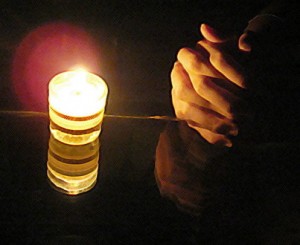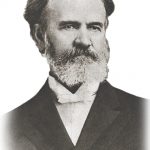What is Prayer?
 Ideally, all the Christian life is lived in an attitude of prayer. The apostle Paul says: “And whatever you do, in word or deed, do everything in the name of the Lord Jesus, giving thanks to God the Father through him.” (Colossians 3:17 NRSV). Prayer is to be infused into all we do.
Ideally, all the Christian life is lived in an attitude of prayer. The apostle Paul says: “And whatever you do, in word or deed, do everything in the name of the Lord Jesus, giving thanks to God the Father through him.” (Colossians 3:17 NRSV). Prayer is to be infused into all we do.
Nevertheless, it is helpful to get some basic, rudimentary idea of what prayer essentially is. So, the following reflections are aimed toward developing a basic definition of prayer. In order to discuss prayer, we need to know what we are talking about. I will lean heavily on the Biblical practices of prayer as I try to work toward a definition.
The Bible often talks about prayer. It also gives us specific examples of prayers that biblical characters prayed. Both are important in understanding the nature of prayer and the kinds of prayer that are appropriate to the Christian faith.
There are some underlying assumptions to prayer.
- It is assumed that it is possible to address God.
- It is assumed that it is desirable to address God.
- It is assumed that God responds to prayer.
In Psalm 65:2 God is addressed as: “O you who answer prayer!” (שֹׁמֵעַתְּפִלָּה).
Jesus said in Matthew 7:11: “If you then, who are evil, know how to give good gifts to your children, how much more will your Father in heaven give good things to those who ask him!”
But, the issue is more complex than it might first appear. What is prayer? What qualifies as a prayer?
There are many different types of prayer. A prayer could be a sudden outburst of praise. A prayer could be cry of immediate need. A prayer could be a hymn of praise to God — even though God is spoken of in the third person and not directly addressed, as in this case:
“Immortal, invisible, God only wise,
In light inaccessible hid from our eyes,
Most blessèd, most glorious, the Ancient of Days,
Almighty, victorious, Thy great Name we praise.”
 And, prayer can be expressed without words. There is silent prayer — more intent on listening to God than speaking to God. There is prayer through sacrifice in the Old Testament. But, dance can also be prayer, a song can be a prayer, some ritual act or motion can be a prayer. What about the conversations with God that are recorded in the Bible? Wouldn’t these also qualify in some sense as prayer?
And, prayer can be expressed without words. There is silent prayer — more intent on listening to God than speaking to God. There is prayer through sacrifice in the Old Testament. But, dance can also be prayer, a song can be a prayer, some ritual act or motion can be a prayer. What about the conversations with God that are recorded in the Bible? Wouldn’t these also qualify in some sense as prayer?
So, while it might not seem so at first, really there is quite a bit that is subsumed under the category of “prayer.”
Biblical scholars, therefore, are quite a bit more narrow in their definition of prayer. Without a more precise definition, it is difficult to discuss. They tend to speak of (a.) “psalms” as the poetic compositions that were used in Israel’s worship, and (b.) “prayers” as prose writings addressed to God which usually contain some type of request. In some instances it is difficult to distinguish a “prayer” in this sense from what might be called a “conversation with God.” Biblical prayer is not understood as a one way communication.
Prayers of Petition (asking God for something) and Intercession (asking God for some blessing on someone else) are prominent throughout the Scriptures.
And it is at this point that our theology can trip us up. It is at this point that intellectual problems arise.
 I feel very strongly that our theology must support our practice. If my theology undermines my ability to ask and pray, it is my theology that needs to be re-adjusted. We were instructed to pray: “Give us this day our daily bread.” This is Petitionary prayer. We are continually given examples of people who prayed on behalf of others. This is Intercessory Prayer. And, we are told: “Ask, and it will be given you; search, and you will find; knock, and the door will be opened for you. For everyone who asks receives, and everyone who searches finds, and for everyone who knocks, the door will be opened.” (Matthew 7:7-8 NRSV)
I feel very strongly that our theology must support our practice. If my theology undermines my ability to ask and pray, it is my theology that needs to be re-adjusted. We were instructed to pray: “Give us this day our daily bread.” This is Petitionary prayer. We are continually given examples of people who prayed on behalf of others. This is Intercessory Prayer. And, we are told: “Ask, and it will be given you; search, and you will find; knock, and the door will be opened for you. For everyone who asks receives, and everyone who searches finds, and for everyone who knocks, the door will be opened.” (Matthew 7:7-8 NRSV)
Many years ago, Intercessory prayer started to become the heart and soul of my prayer life. Prayer became a ministry and an outreach.
But, let me suggest that, human nature being what it is, the most basic and common form of prayer is a plea for help. This is where prayer starts. In difficult situations we instinctively call out for help. So, from the standpoint of human experience petitionary prayer is bound to be the individual’s first experience of prayer. It is from this point we move up the ladder of prayer. We learn to pray for others. We learn to make gratitude — praise and thanksgiving — a more central part of our prayer life. We learn to listen. We learn that prayer can be simply the sense of being in God’s presence. But, we will never reach the higher realms of prayer without starting somewhere. And, generally speaking, that somewhere is “God help me!”
Prayer is a complex phenomenon. It helps to narrow our focus in first talking about it: it is a request spoken to God.
What is it?
“Prayer is the soul’s sincere desire,
Unuttered or expressed;
The motion of a hidden fire
That trembles in the breast.
“Prayer is the burden of a sigh,
The falling of a tear
The upward glancing of an eye,
When none but God is near.
“Prayer is the simplest form of speech
That infant lips can try;
Prayer, the sublimest strains
That reach The Majesty on high.
“Prayer is the Christian’s vital breath,
The Christian’s native air,
His watchword at the gates of death;
He enters Heav’n with prayer.
“Prayer is the contrite sinner’s voice,
Returning from his ways,
While angels in their songs rejoice
And cry, “Behold, he prays!”
“The saints in prayer appear as one
In word, in deed, and mind,
While with the Father and the Son
Sweet fellowship they find.
“No prayer is made by man alone
The Holy Spirit pleads,
And Jesus, on th’eternal throne,
For sinners intercedes.
“O Thou by Whom we come to God,
The Life, the Truth, the Way,
The path of prayer Thyself hast trod:
Lord, teach us how to pray.”











